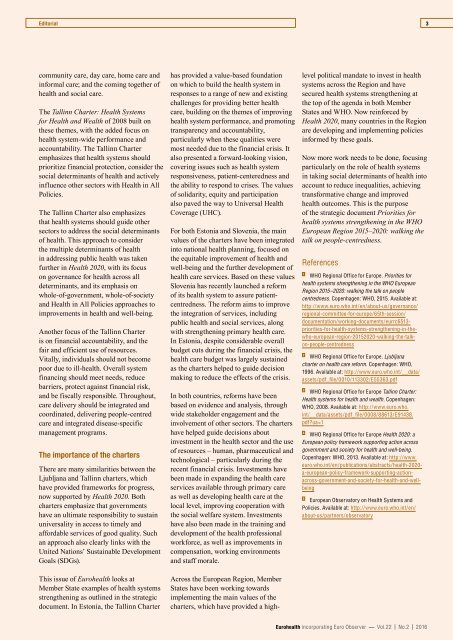EUROHEALTH
Eurohealth-volume22-number2-2016
Eurohealth-volume22-number2-2016
You also want an ePaper? Increase the reach of your titles
YUMPU automatically turns print PDFs into web optimized ePapers that Google loves.
Editorial<br />
3<br />
community care, day care, home care and<br />
informal care; and the coming together of<br />
health and social care.<br />
The Tallinn Charter: Health Systems<br />
for Health and Wealth of 2008 built on<br />
these themes, with the added focus on<br />
health system-wide performance and<br />
accountability. The Tallinn Charter<br />
emphasizes that health systems should<br />
prioritize financial protection, consider the<br />
social determinants of health and actively<br />
influence other sectors with Health in All<br />
Policies.<br />
The Tallinn Charter also emphasizes<br />
that health systems should guide other<br />
sectors to address the social determinants<br />
of health. This approach to consider<br />
the multiple determinants of health<br />
in addressing public health was taken<br />
further in Health 2020, with its focus<br />
on governance for health across all<br />
determinants, and its emphasis on<br />
whole-of-government, whole-of-society<br />
and Health in All Policies approaches to<br />
improvements in health and well-being.<br />
Another focus of the Tallinn Charter<br />
is on financial accountability, and the<br />
fair and efficient use of resources.<br />
Vitally, individuals should not become<br />
poor due to ill-health. Overall system<br />
financing should meet needs, reduce<br />
barriers, protect against financial risk,<br />
and be fiscally responsible. Throughout,<br />
care delivery should be integrated and<br />
coordinated, delivering people-centred<br />
care and integrated disease-specific<br />
management programs.<br />
The importance of the charters<br />
There are many similarities between the<br />
Ljubljana and Tallinn charters, which<br />
have provided frameworks for progress,<br />
now supported by Health 2020. Both<br />
charters emphasize that governments<br />
have an ultimate responsibility to sustain<br />
universality in access to timely and<br />
affordable services of good quality. Such<br />
an approach also clearly links with the<br />
United Nations’ Sustainable Development<br />
Goals (SDGs).<br />
This issue of Eurohealth looks at<br />
Member State examples of health systems<br />
strengthening as outlined in the strategic<br />
document. In Estonia, the Tallinn Charter<br />
has provided a value-based foundation<br />
on which to build the health system in<br />
responses to a range of new and existing<br />
challenges for providing better health<br />
care, building on the themes of improving<br />
health system performance, and promoting<br />
transparency and accountability,<br />
particularly when these qualities were<br />
most needed due to the financial crisis. It<br />
also presented a forward-looking vision,<br />
covering issues such as health system<br />
responsiveness, patient-centeredness and<br />
the ability to respond to crises. The values<br />
of solidarity, equity and participation<br />
also paved the way to Universal Health<br />
Coverage (UHC).<br />
For both Estonia and Slovenia, the main<br />
values of the charters have been integrated<br />
into national health planning, focused on<br />
the equitable improvement of health and<br />
well-being and the further development of<br />
health care services. Based on these values<br />
Slovenia has recently launched a reform<br />
of its health system to assure patientcentredness.<br />
The reform aims to improve<br />
the integration of services, including<br />
public health and social services, along<br />
with strengthening primary health care.<br />
In Estonia, despite considerable overall<br />
budget cuts during the financial crisis, the<br />
health care budget was largely sustained<br />
as the charters helped to guide decision<br />
making to reduce the effects of the crisis.<br />
In both countries, reforms have been<br />
based on evidence and analysis, through<br />
wide stakeholder engagement and the<br />
involvement of other sectors. The charters<br />
have helped guide decisions about<br />
investment in the health sector and the use<br />
of resources – human, pharmaceutical and<br />
technological – particularly during the<br />
recent financial crisis. Investments have<br />
been made in expanding the health care<br />
services available through primary care<br />
as well as developing health care at the<br />
local level, improving cooperation with<br />
the social welfare system. Investments<br />
have also been made in the training and<br />
development of the health professional<br />
workforce, as well as improvements in<br />
compensation, working environments<br />
and staff morale.<br />
Across the European Region, Member<br />
States have been working towards<br />
implementing the main values of the<br />
charters, which have provided a highlevel<br />
political mandate to invest in health<br />
systems across the Region and have<br />
secured health systems strengthening at<br />
the top of the agenda in both Member<br />
States and WHO. Now reinforced by<br />
Health 2020, many countries in the Region<br />
are developing and implementing policies<br />
informed by these goals.<br />
Now more work needs to be done, focusing<br />
particularly on the role of health systems<br />
in taking social determinants of health into<br />
account to reduce inequalities, achieving<br />
transformative change and improved<br />
health outcomes. This is the purpose<br />
of the strategic document Priorities for<br />
health systems strengthening in the WHO<br />
European Region 2015–2020: walking the<br />
talk on people-centredness.<br />
References<br />
1<br />
WHO Regional Office for Europe. Priorities for<br />
health systems strengthening in the WHO European<br />
Region 2015–2020: walking the talk on people<br />
centredness. Copenhagen: WHO, 2015. Available at:<br />
http://www.euro.who.int/en/about-us/governance/<br />
regional-committee-for-europe/65th-session/<br />
documentation/working-documents/eurrc6513-<br />
priorities-for-health-systems-strengthening-in-thewho-european-region-20152020-walking-the-talkon-people-centredness<br />
2<br />
WHO Regional Office for Europe. Ljubljana<br />
charter on health care reform. Copenhagen: WHO,<br />
1996. Available at: http://www.euro.who.int/__data/<br />
assets/pdf_file/0010/113302/E55363.pdf<br />
3<br />
WHO Regional Office for Europe Tallinn Charter:<br />
Health systems for health and wealth. Copenhagen:<br />
WHO, 2008. Available at: http://www.euro.who.<br />
int/__data/assets/pdf_file/0008/88613/E91438.<br />
pdf?ua=1<br />
4<br />
WHO Regional Office for Europe Health 2020: a<br />
European policy framework supporting action across<br />
government and society for health and well-being.<br />
Copenhagen: WHO, 2013. Available at: http://www.<br />
euro.who.int/en/publications/abstracts/health-2020-<br />
a-european-policy-framework-supporting-actionacross-government-and-society-for-health-and-wellbeing<br />
5<br />
European Observatory on Health Systems and<br />
Policies. Available at: http://www.euro.who.int/en/<br />
about-us/partners/observatory<br />
Eurohealth incorporating Euro Observer — Vol.22 | No.2 | 2016
















